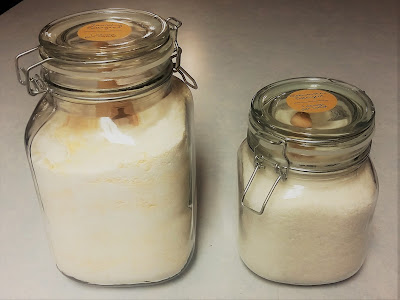DIY Laundry Soap
1 bar Fels-Naptha soap (or castille soap)*
2 c borax
1 c washing soda
1 c Oxyclean (or more washing soda)
1 c baking soda
30 drops essential oil (optional)
Make sure to finely grate or chop your soap. I found that freezing it for 30-60 minutes and using a food processor to be very effective, but you could use a grater or other method. Mix all ingredients together and store in an air tight container. If using essential oils, make sure to mix in well before storing, so that the oils are evenly distributed and your soap does not clump. My personal preference for essential oils are lavender and sandalwood, but choose whatever you enjoy the scent of or find relaxing (a great choice for bedding).
Use 1 Tbsp per load. This recipe is great for top load, front load, and HE washers (I've actually tested it in all 3). For a simple, green fabric softener use vinegar in the washer as you would liquid fabric softener, or add some wool balls to your dryer (either option can be scented using essential oils as well!)
*If you are looking to create a vegan soap, be careful which bar you choose. Both Fels-Naptha and Zote use tallow, but castille bars by definition are 100% vegetable oil (typically olive oil). Some verified vegan brands of castille soap are Dr. Bronner, Kirk's, and Mrs. Meyer's. All other ingredients are mineral-based, but you may want to dig into which brands are cruelty-free.
DIY Dishwasher Soap
1 c borax (or baking soda)
1 c washing soda
1/2 c kosher salt
1/2 c citric acid
20 drops essential oil (optional)
Mix all ingredients together and store in an air tight container. If using essential oils, make sure to mix in well before storing, so that the oils are evenly distributed and your soap does not clump. My personal preference for essential oils in this application is citrus, such as lemon, grapefruit, or a blend. I currently am using a cleansing blend of lemon, clove, eucalyptus, and rosemary.
I've also seen recipes floating around that add castille soap. If you are concerned about the lack of soap vs cleaning agent, feel free to add about 1/4 cup finely grated castille soap (sorry, I'm not sure how that translates into bars as I don't add it myself). Make sure you grab castille soap, you do not want a soap that suds in this mixture!

Something you will want to note is that the citric acid will attract moisture and may cause your soap to clump (or if you are really unlucky, fuse into 1 large block). This won't hurt anything, but it can be annoying and may make it harder for your soap to dissolve. Two good tips I've found are to leave your soap in a large, uncovered bowl for a couple days to let it dry out (make sure to stir it periodically to help break up any clumps), and to make a desiccant to keep in your container to absorb any excess moisture (for example powdered clay or dry rice in an empty tea bag, pantyhose, or sock).
Use 1 Tbsp per load. For a simple rinse agent, use white vinegar.
Now, there are some arguments against using Borax. I'm still working my way through the data, but as yet have not come across concrete examples of Borax actually being harmful (just some arguments that it could be). I encourage you to do your own digging as well. Crunchy Betty does a great job of collecting the arguments for both sides. That being said, I am looking into alternate solutions out of curiosity. In the meantime, I've been using laundry soap with Borax for years and have no complaints.



No comments:
Post a Comment